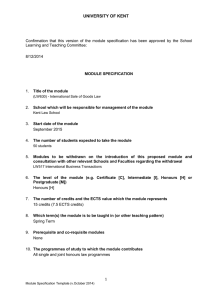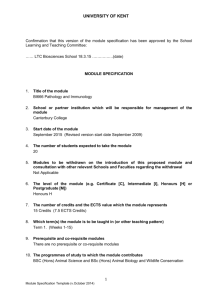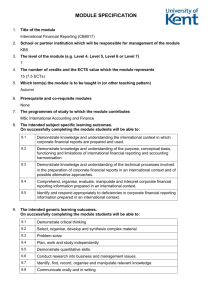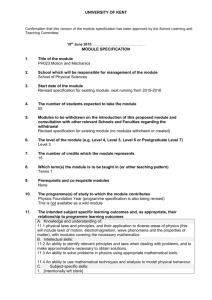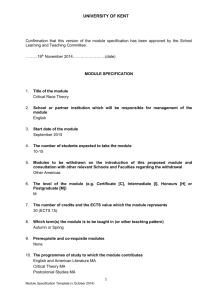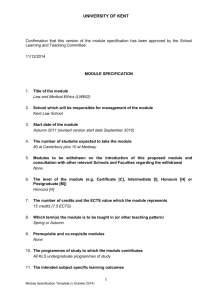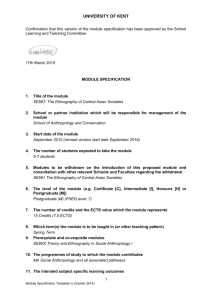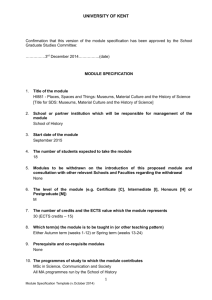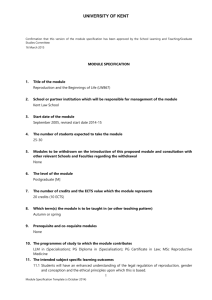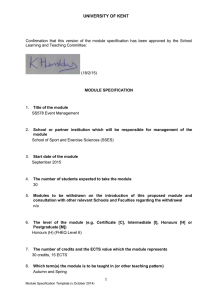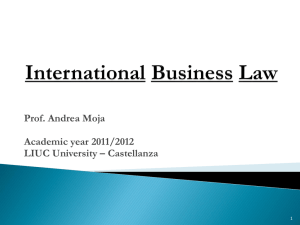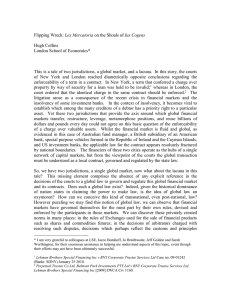University of Kent
advertisement
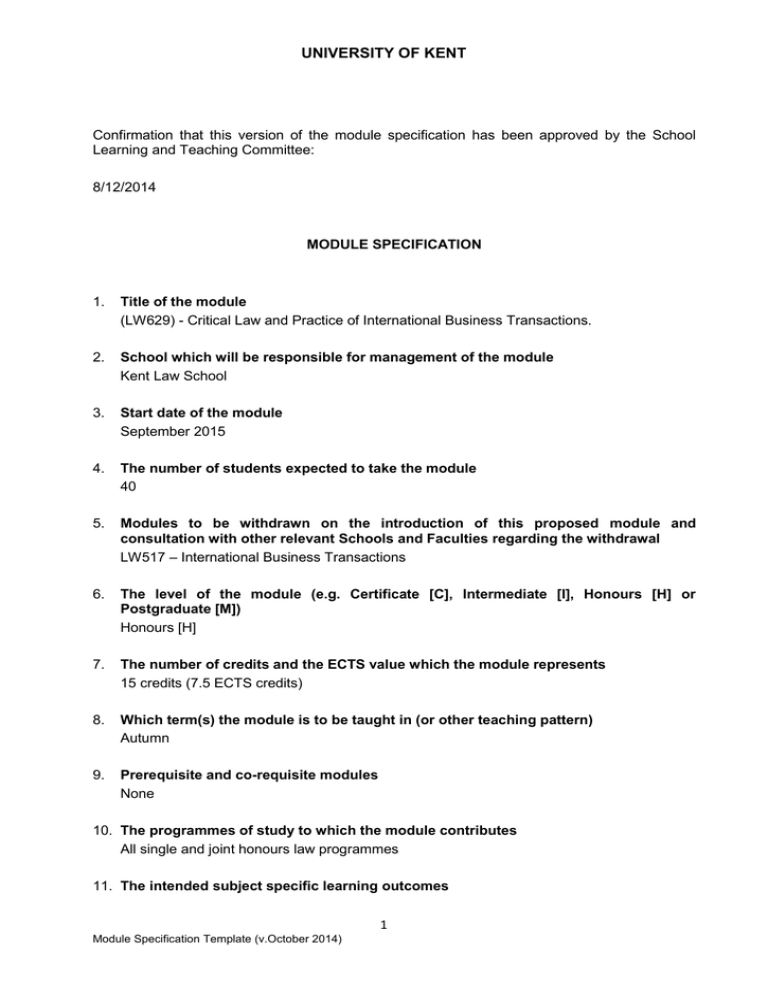
UNIVERSITY OF KENT Confirmation that this version of the module specification has been approved by the School Learning and Teaching Committee: 8/12/2014 MODULE SPECIFICATION 1. Title of the module (LW629) - Critical Law and Practice of International Business Transactions. 2. School which will be responsible for management of the module Kent Law School 3. Start date of the module September 2015 4. The number of students expected to take the module 40 5. Modules to be withdrawn on the introduction of this proposed module and consultation with other relevant Schools and Faculties regarding the withdrawal LW517 – International Business Transactions 6. The level of the module (e.g. Certificate [C], Intermediate [I], Honours [H] or Postgraduate [M]) Honours [H] 7. The number of credits and the ECTS value which the module represents 15 credits (7.5 ECTS credits) 8. Which term(s) the module is to be taught in (or other teaching pattern) Autumn 9. Prerequisite and co-requisite modules None 10. The programmes of study to which the module contributes All single and joint honours law programmes 11. The intended subject specific learning outcomes 1 Module Specification Template (v.October 2014) UNIVERSITY OF KENT Students who successfully complete this module will have: 11.1 knowledge and understanding, including an introduction to a range of critical and theoretical perspectives, of the structure and distribution of power among states and the effects of this on international trade as well as parties in different states; 11.2 knowledge and understanding of the legal rules governing international trade; 11.3 an introduction to and understanding of international business transactions; 11.4 knowledge and understanding of current developments in international trade regulation; 11.5 an ability to identify the legal validity of contracts governing international business transactions; 11.6 an ability to identify the institutional structures of hegemony and identify their causal power in determining the way in which individuals and corporate persons may respond to them within the national and international system; 11.7 an ability to evaluate the impact of a range of treaties and Statutes of England and Wales on the emergence and development of: - Free trade - Dispute resolution - Anticorruption and money laundering 11.8 an ability to read and evaluate legal texts and cases and understand their relevance to international trade and cross national business transactions. 12. The intended generic learning outcomes Students who successfully complete this module will be able to: 12.1 conduct independent research which informs a sustained and complex argument; 12.2 Coherently present complex arguments in writing; 12.3 appreciate that juridical problems can only be fully understood through interdisciplinary research methods; 12.4 use electronic data bases for original legal research – e.g. carry out online research, conduct subject specific journal searches; 12.5 make proper use of the library resources by way of law reports, articles and monographs and textbooks. 13. A synopsis of the curriculum The module focuses on current issues in the law and practice of international business and trade law from critical perspectives. This includes exposing deficiencies in the regulation of international trade finance, international marketing operations, Countertrade, international commercial dispute settlement mechanisms and corruption in international business. The module considers the involvement of emerging business and financial jurisdictions in international trade. It broadly explores the inequities of global integration of international trade law and considers the influences of European Community law and those of leading developed economies and financial jurisdictions on regulation and actual practice of the field of international business transactions. Attention will be given to specialist and emerging areas of law such as international mergers and acquisition as well as philosophical aspects of international trade such as the Lex Mercatoria. It seeks to provide a comparative overview of emerging trends in international business regulation and aims to make students aware of ethical dimensions of international business transactions. Topics to 2 Module Specification Template (v.October 2014) UNIVERSITY OF KENT be covered include International Trade within the contexts of public and private international law and international politics; Development and underdevelopment of commercial laws in international trade; mergers and acquisitions; counter trade as an alternative to current system of international business and trade; international franchising and agencies abroad; international commercial dispute settlement mechanisms; international corruption and the bribery of foreign officials; doctrine and practice of the New Lex Mercatoria. 14. Indicative Reading List • • • • • • • • • • • • Braithwaite and Drahos, Global Business Regulation (Cambridge: Cambridge University Press, 2000). G. Moens and P. Gillies, International Trade and Business: Law, Policy and Ethics Cavendish Publishing Pty. Ltd., 1998. J. Hill, The Law Relating to International Commercial Disputes 2nd ed., 1998, L/L/P. Jarrod Wiener, Globalization and Harmonization of Law, Pinter, London, 1999. K.P. Berger, The Creeping Codification of the Lex Mercatoria, Kluwer, 1999. Peter T. Muchlinski Multinational Enterprises & the Law Second Edition Oxford University Press 2007. I. Schwenzer, C. Fountoulakis and M Dimsey, International Sales Law: A Guide to the CISG Hart Publishing, 2012. J.H. Dalhuisen, Dalhuisen on Transnational and Comparative Commercial, Financial and Trade Law 3rd Ed. Hart Publishing, 2007. Redfern and Hunter, Law and Practice of International Commercial Arbitration, 4th ed., 1999, Sweet & Maxwell. Ray August, International Business Law: Text, Cases, and Readings Prentice Hall, 2004 Dambisa Moyo, “Dead Aid: Why Aid Is Not Working and How There Is Another Way for Africa” Penguin Books, 2009. Walter Rodney How Europe Underdeveloped Africa Howard University Press, 1981. 15. Learning and Teaching Methods, including the nature and number of contact hours and the total study hours which will be expected of students, and how these relate to achievement of the intended module learning outcomes General: The key learning and teaching methods are: lectures, both traditional and interactive (Socratic); tutor-led seminars; directed reading; independent research for course assessments; and feedback on course assessments. Specific: There will be a one hour lecture each week. The purpose of the lectures will be to deliver (by both the dissemination of information and by example) the subject specific learning outcomes 11.1 - 6 and the generic learning outcomes 12.1 and 12.2. Seminars will play a complementary role to lectures and will test student learning of substantive content thus helping to deliver specific learning outcomes 11.7 – 8. Through effective seminar leadership the students will achieve the generic learning outcomes 12.1 – 5. 3 Module Specification Template (v.October 2014) UNIVERSITY OF KENT This module is allocated 150 hours of study, with 10 hours allocated to lectures and 10 to seminars. 130 hours are allocated to independent study and preparation of special study essay. 16. Assessment methods and how these relate to testing achievement of the intended module learning outcomes The module will be assessed by 50% examination and 50% coursework. The assessment strategy is both formative and summative and will involve: (a) An essay of no more than 3000 words to develop and assess skills necessary for academic writing e.g. citation, structuring an argument, argumentation, independent research and the use of multiple sources. The essay will test module learning outcomes 11.1 – 8 & 12.1 – 5. (b) A 3-hour examination which will test the student’s level of knowledge and understanding of the legal and doctrinal aspects of the topics taught on the course and, the philosophical arguments that lie behind international trade law. It requires the ability to write clearly, to master complex issues, to read and evaluate recommended texts and cases to understand their relevance to the operation of the system of international business and trade law and their role in promoting development. The exam questions will cover the entire course and will encourage the consolidation of learning and provide a sound foundation for further postgraduate study of international commercial law. The examination will test module learning outcomes 11.1 – 8 & 12.1 – 5. 17. Implications for learning resources, including staff, library, IT and space The module can be taught with existing staffing, space, library and IT resources 18. The School recognises and has embedded the expectations of current disability equality legislation, and supports students with a declared disability or special educational need in its teaching. Within this module we will make reasonable adjustments wherever necessary, including additional or substitute materials, teaching modes or assessment methods for students who have declared and discussed their learning support needs. Arrangements for students with declared disabilities will be made on an individual basis, in consultation with the University’s disability/dyslexia support service, and specialist support will be provided where needed. 19. Campus(es) where module will be delivered: Canterbury 4 Module Specification Template (v.October 2014)
